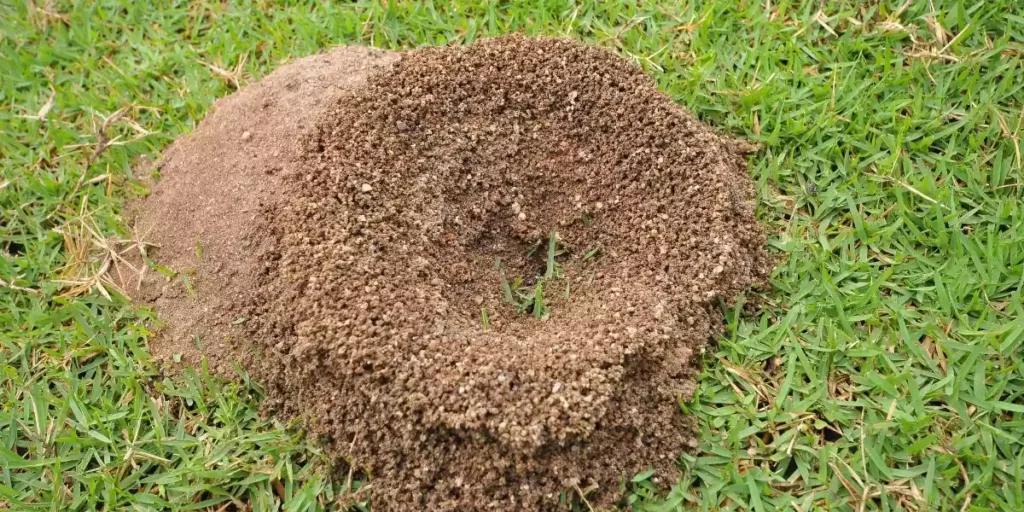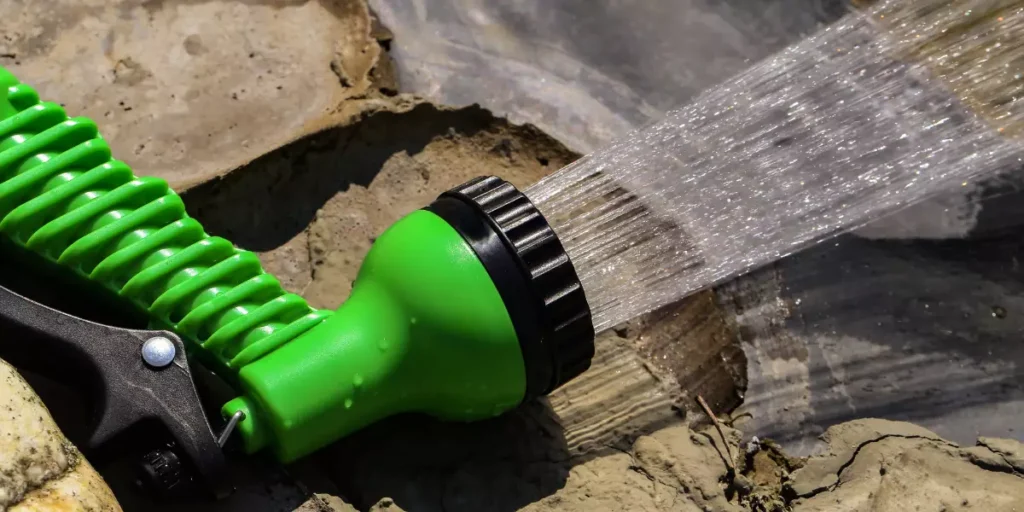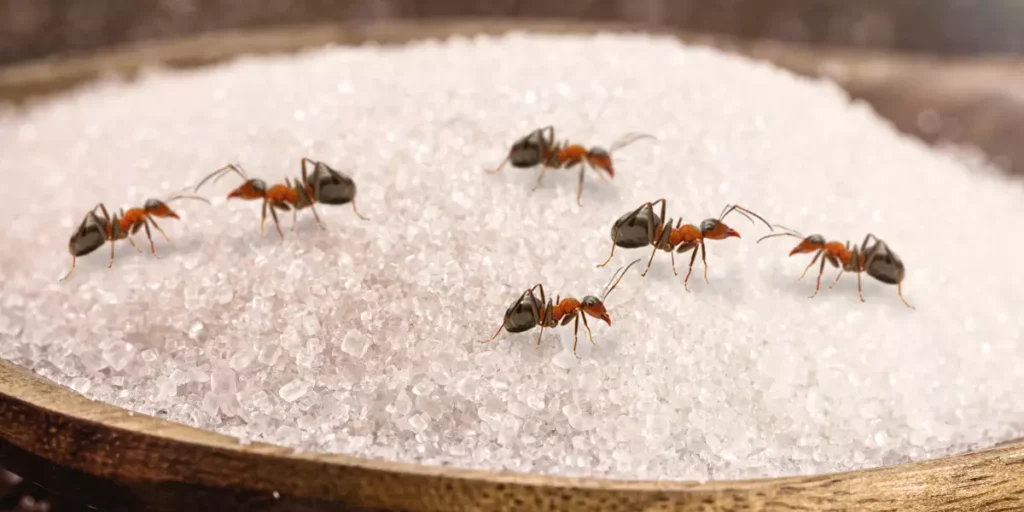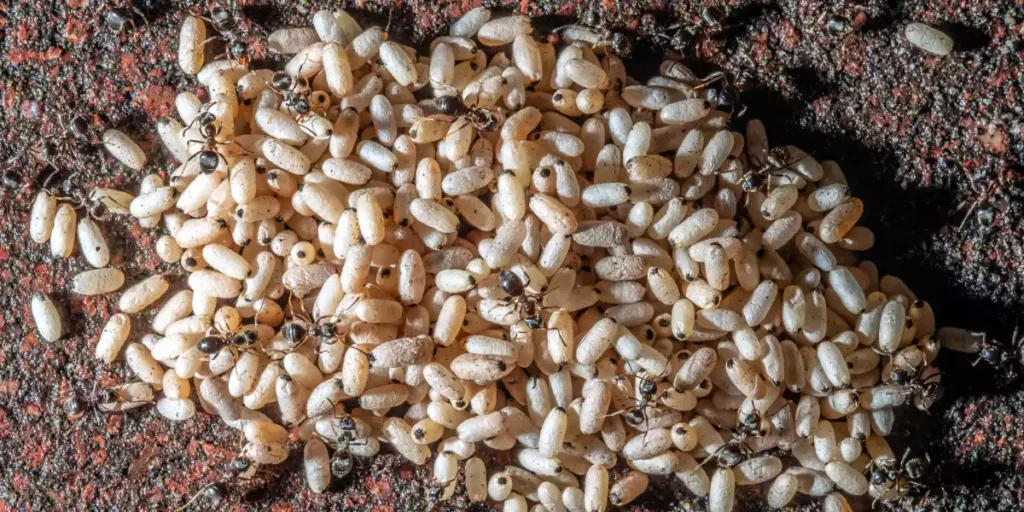Tired of those pesky ants invading your lawn and wreaking havoc on your grass and plants? Well, you’re in luck! In this article, we’ll show you some tried and true methods to get rid of ants in your lawn.
But before we dive into the nitty-gritty of ant elimination, let’s pause for a moment and ask ourselves a simple question…
Should we really be getting rid of ants in the first place?
Sure, ants can be a nuisance, creating ant mounds that make mowing a nightmare and providing protection to aphids that harm our precious plants. But here’s a thought: perhaps these little critters have something to offer us. They can actually help with some pest control and enrich the soil. So, before we grab our weapons of ant destruction, let’s consider whether it’s absolutely necessary to exterminate them.
Before you go further, I’ve previously written a more general article titled “How to Get Rid Of Ants in the Garden?” that you might want to check later.
This article is more focused on lawn care practices, rather than having ants as a general gardening problem.

Key Takeaways
- Natural remedies such as soapy water, vinegar, diatomaceous earth, and baking soda can be effective in getting rid of ants in the lawn.
- Boiling water can be used to attack ant nests directly and force ants to abandon the nest.
- Raking the anthill and disturbing the ants can also encourage them to leave the nest.
- Chemical pesticides should be used as a last resort and only in cases where other methods have failed.
Should you get rid of ants in your lawn in the first place?
Before diving into methods to get rid of ants from your lawn, you may want to consider whether it’s necessary to evict them in the first place. Ants can actually be beneficial for your lawn as they eat pests, help aerate the soil, and even pollinate flowers.
However, if the ants are causing problems like creating anthills that make mowing difficult or damaging the grass’s root system, then it might be necessary to take action. Keep in mind that there are many home remedies and natural solutions that are inexpensive and safe to use.
It’s important to strike a balance between maintaining a proper lawn care and preserving the benefits that ants bring. Assess the situation and decide if it’s worth the effort to get rid of the ants or if leaving them in peace is a better option for your lawn.
Organic methods for getting rid of ants
If you’re looking for organic methods to get rid of ants in your lawn, there are several options you can try. Those methods are best especially when the ant mould lies near a composting bin. If that’s the case, please read: “Is it okay to have ants in your compost? (8 methods to Fight Ants!)“
Boiling water
The boiling water method is a powerful and dramatic way to attack an ant nest in your lawn. By pouring scalding hot water directly into the heart of the anthill, you can instantly kill the ants and disrupt their underground tunnels. It’s an effective and natural method that doesn’t require the use of any chemicals.
To use this method, boil a large pot of water and carefully pour it directly into the nest. The hot water will kill the ants on contact and seep into the tunnels, destroying the entire colony. It’s important to be cautious when using this method, as boiling water can also damage the grass and soil. Therefore, it’s best to target specific anthills and avoid pouring boiling water on healthy areas of the lawn.
Soapy water
Mix up a batch of soapy water and grab your trusty spray bottle to tackle those pesky ants in your yard. Soapy water is an effective and safe way to get rid of ants in your lawn. Here’s how to do it:
- Fill a spray bottle with warm water.
- Add a few drops of dish soap and shake well to mix.
- Spray the soapy water directly onto ant trails and nests.
- Make sure to thoroughly coat the areas where ants are present.
- The soap in the water will suffocate the ants and erase their pheromone trails.
- Repeat this process daily until the ants are gone.
- Remember to target any new ant activity with the soapy water spray.
Using soapy water is a simple and inexpensive method to control ants in your lawn. It’s also safe for your grass and plants. Give it a try and say goodbye to those unwanted ant colonies!
White Vinegar
Imagine having a simple and effective solution right in your kitchen to keep those pesky ants at bay in your yard – white vinegar is the answer!
Vinegar is a natural and non-toxic repellent that disrupts ants’ pheromones and navigation, making them turn away from your lawn.
To use vinegar, you can create a spray by mixing equal parts vinegar and water in a spray bottle. Spray this solution directly onto ant trails and nests, focusing on problem areas.
If you want to target ant nests specifically, you can pour undiluted vinegar directly into the nest. However, keep in mind that vinegar can damage plants and soil, so be cautious when using it on your lawn.
It’s important to note that vinegar may not be as effective for certain ant species, like carpenter ants. If the infestation persists or worsens, it may be necessary to seek professional help or consider alternative methods.

Diatomaceous Earth (DE)
Looking for a safe and natural way to combat those pesky ants in your yard? Consider using diatomaceous earth (DE) to effectively deter and eliminate them.
DE is a fine dust made from the fossilized remains of diatoms, a type of algae. Here’s how you can use DE to get rid of ants in your lawn:
- Sprinkle DE around ant trails, nests, and entry points to create a barrier that ants won’t cross.
- The sharp particles in DE will penetrate the ants’ exoskeleton, causing them to dehydrate and die.
- Reapply DE after rain or watering, as it can lose its effectiveness when wet.
- Be sure to use food-grade DE, as other forms may contain harmful substances.
By using diatomaceous earth, you can safely and naturally control ant infestations in your lawn. Remember to follow the instructions carefully and consider wearing a mask to avoid inhaling the dust.
Natural repellents
Sprinkle some cinnamon or cayenne pepper around your lawn to naturally repel those pesky ants. These natural repellents can be effective at deterring ants from entering your lawn and forming nests. The strong aroma of cinnamon or cayenne pepper disrupts ants’ pheromone trails, making it difficult for them to navigate and find food sources.
When sprinkled around the perimeter of your lawn or near ant trails, these spices can act as a barrier, preventing ants from crossing into your yard. Be sure to reapply the cinnamon or cayenne pepper after rain or watering to maintain their effectiveness. However, it’s important to note that the effectiveness of these natural repellents may vary depending on the ant species and the severity of the infestation.
If the ant problem persists, consider using other methods or seeking professional help.
Baking Soda
To effectively eliminate ants from your lawn, you can use baking soda as a safe and affordable solution. Baking soda works by suffocating the ants and disrupting their pheromone trails, making it difficult for them to communicate and navigate. Here are five simple steps to use baking soda as an ant repellent:
- Locate ant trails and nests in your lawn.
- Sprinkle baking soda directly on the ant trails and around the nests.
- Reapply the baking soda every few days or after rain to ensure it’s effectiveness.
- Avoid watering the area where baking soda is applied, as it may reduce it’s effectiveness.
Monitor the ant activity and repeat the process until the ants are completely gone.
Remember, baking soda is a non-toxic and environmentally friendly option to get rid of ants in your lawn. It may take some time and persistence, but with consistent application, you can enjoy an ant-free lawn.

Drowning them with a garden hose
Using a garden hose to drown those pesky ants in your lawn can be a satisfying and effective way to eliminate them. Start by locating the ant nest or trail. Once you’ve identified their territory, turn on your garden hose to a high-pressure setting. Direct the stream of water directly onto the nest or trail, making sure to cover the entire area. The force of the water will drown the ants and wash away their nests.
Continue spraying for a few minutes to ensure that all the ants are gone. It’s important to note that this method may not be as effective for larger ant colonies with extensive nests. However, for smaller infestations, drowning the ants with a garden hose can be a simple and eco-friendly solution to get rid of them.
Remember to repeat this process as needed to keep your lawn ant-free.
Boric acid mixed with sugar (Borax)
For a more effective and long-lasting solution, try combining boric acid with sugar to create a deadly ant bait that’ll lure the ants away from your beautiful lawn and eradicate them for good.
Boric acid is a potent insecticide that targets the ants’ nervous system, while sugar acts as a tempting attractant. The ants are attracted to the sweet scent of the sugar and unknowingly carry the boric acid back to their colony. Once the ants consume the bait, the boric acid kills them and eventually reaches the queen, ensuring the complete elimination of the colony.
To create the bait, mix equal parts of boric acid and sugar and sprinkle it near ant trails or directly on their nests. Remember to keep this bait out of reach of children and pets to prevent accidental ingestion. Keep in mind that it may take a few days or even weeks for the bait to fully eliminate the ant population, so be patient and continue to monitor the situation.

Salt
Salt is a popular home remedy for deterring ants from invading your lawn. It works by dehydrating the ants and disrupting their ability to navigate. To use salt as a deterrent, you can mix it with water to create a spray or simply sprinkle it directly on ant trails and nests.
Start by identifying the areas where ants are present and sprinkle a thin layer of salt along their paths. You can also dissolve salt in water and spray it over the affected areas. However, it’s important to note that while salt can be effective in repelling ants, it can also harm your grass and plants if used in excess. Therefore, it’s best to use salt sparingly and monitor the effects on your lawn.
Invade their nest with a rake or a stick
Now that you’ve learned how to use salt to deter ants in your lawn, let’s discuss another method to combat these pesky insects.
One effective way to get rid of those unwanted guests is to locate their ant hill and invade it with a rake or a stick. This method disrupts their living space, causing them to abandon the nest and find a new location. When using a rake or a stick, make sure to carefully break open the ant nest without damaging the lawn.
You can also use this opportunity to pour boiling water or other remedies directly into the nest for added effectiveness. Remember to take precautions and wear protective clothing, as disturbing the ants can lead to bites or stings.
By invading their nest, you can significantly reduce the ant population in your lawn and regain control over your outdoor space.
Chemical solutions
To effectively eliminate ants in your lawn, consider using chemical solutions that can target and destroy ant colonies. You can use professional-grade insecticides that have been shown to eliminate up to 99% of ants in treated areas. These insecticides are specifically designed to kill ants and can be applied directly to the ant trails, nests, or the surrounding areas. Follow the instructions on the product label carefully to ensure safe and effective use.
It’s important to note that chemical solutions should be used as a last resort and with caution, as they can have negative effects on the environment and other beneficial insects. Before using any chemical solution, consider trying natural remedies and preventive measures to control ants in your lawn.
How long will white vinegar keep ants away?
If you’re wondering how long white vinegar will keep those pesky ants away, you’ll be pleased to know that it can be an effective repellent for a few days! Vinegar disrupts ants’ pheromones, making it difficult for them to navigate and find food sources.
Here are three reasons why vinegar can be a great solution to keep ants at bay:
- It’s safe and non-toxic: Vinegar is a natural remedy that’s safe to use around children and pets. You don’t have to worry about harmful chemicals or toxins.
- It’s easy to use: Simply mix equal parts of vinegar and water in a spray bottle and apply it to areas where ants are present. Spray it directly on ant trails, entry points, or even pour it into ant nests.
- It’s cost-effective: Vinegar is a common household item that’s readily available and inexpensive. You don’t have to spend a lot of money on commercial ant repellents.
Remember, vinegar isn’t a long-term solution, but it can be effective in keeping ants away for a few days. If the problem persists, you may want to consider other remedies or consult a professional for further assistance.
What do ants hate the most?
Avoiding ants in your lawn is as easy as giving them a warm welcome and providing them with a cozy home. However, if you want to keep ants away, there are a few things they hate the most.
First, ants despise strong-smelling substances like vinegar, cinnamon, and cayenne pepper. Spraying or sprinkling these around your lawn can deter them from creating nests.
Additionally, ants detest certain essential oils like peppermint, lemon, and tea tree oil. Dilute these oils with water and spray them in areas where ants are commonly found.
Another effective method is to create a barrier using substances like diatomaceous earth, baby powder, or baking soda. These powders can suffocate ants and prevent them from entering your lawn.
By implementing these strategies, you can make your lawn a less appealing place for ants to call home.

What will ants not cross?
Create a protective barrier using substances like diatomaceous earth, baby powder, or baking soda, and watch as ants refuse to cross into your lawn. Here are four items that ants won’t cross:
- Diatomaceous earth: Sprinkle this fine dust along ant trails and around their nests. The microscopic sharp edges of the diatoms will dehydrate and kill the ants, preventing them from crossing the barrier.
- Baby powder: Sprinkle baby powder along ant trails or around their nests. The powder will block the ants’ spiracles (breathing holes) and suffocate them, deterring them from crossing the barrier.
- Baking soda: Create a line of baking soda along ant trails or around their nests. When ants come into contact with the baking soda, it’ll disrupt their pheromone trails and deter them from crossing.
- Essential oils: Certain essential oils, such as peppermint, citrus, or tea tree oil, can repel ants. Mix a few drops of the oil with water and spray it along ant trails or onto their nests. The strong scent will discourage ants from crossing the barrier.
By using these natural substances, you can create a barrier that ants won’t cross, effectively keeping your lawn ant-free.
What are ants biggest enemies?
Ants have formidable adversaries lurking in their habitats, including predators like spiders, birds, and even bears that pose a grave threat to their survival. These creatures have developed unique ways to exploit ants as a food source.
Some species of spiders attract ants into their webs, trapping them and using their sticky weaponry to spin them into bite-sized morsels. Birds such as sparrows, grouse, and starlings have also been known to feed on ants, swooping down to snatch them up as a tasty snack. Even bears, when they come across a stash of wild honey, may indulge in ants as a sweet treat.
It’s clear that ants face a constant battle for survival against a diverse range of enemies in their environment.
Does salt stop ants?
To deter ants from invading, sprinkle salt along their trails and watch as they quickly retreat. While salt may temporarily repel certain species of ants, it’s not an effective method for killing them. Ants live in colonies, and to eliminate the problem, you need to target the queen. Salt will not kill the queen because ants won’t bring it back to the nest for her to eat.
A more effective DIY solution is to use boric acid. Create a mixture of boric acid, sugar, and water. Soak small cotton balls in the mixture and place them in strategic locations for the ants to find. They’ll be attracted to the sugar, bringing it back to the colony. The boric acid will then kill the queen and eliminate the entire colony.
Should I hide sugary foods, breadcrumbs and other leftovers away?
Hide sugary foods, breadcrumbs, and other leftovers away in sealed containers or in the fridge to prevent attracting ants to your lawn and potentially causing an infestation. Here are five reasons why this is important:
- Ants are attracted to sweet and sugary substances, so keeping these foods tightly sealed will make them less likely to find their way into your yard.
- Leftover crumbs and food scraps can also attract ants, especially if they contain sugar or other enticing ingredients.
- By storing food properly, you’re not only preventing ants from infesting your lawn, but you’re also keeping your food safe from contamination and spoilage.
- Sealed containers and refrigeration help maintain the freshness and quality of your food, making it more enjoyable to eat.
- Taking these precautions will create a clean and inviting environment in your lawn, free from ants and other pests.
By following these simple steps, you can discourage ants from making a home in your lawn and ensure that your food remains safe and free from unwanted visitors.
Does mint repell ants?
Using mint as a natural deterrent can keep those pesky ants away from your lawn. Mint plants emit a strong smell that ants can’t stand, making it an effective way to repel them. You can plant mint around the perimeter of your lawn or create a barrier by placing mint leaves or essential oil near ant entry points. The strong fragrance will disrupt their pheromone trails and discourage them from entering your lawn.
Additionally, mint can also repel other pests, such as mosquitoes and spiders, providing you with multiple benefits. Remember to regularly trim the mint plants to prevent them from spreading uncontrollably. With mint as a natural repellent, you can enjoy your ant-free lawn without the need for harmful pesticides.



